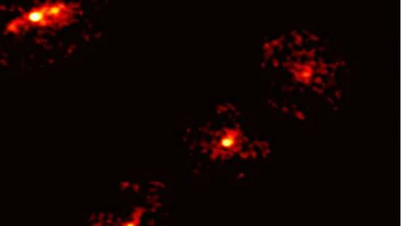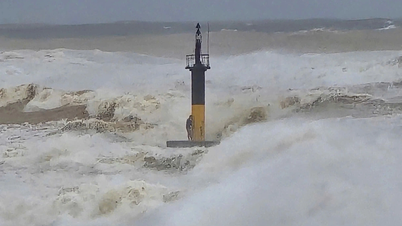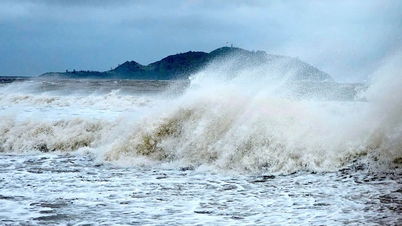Water - one of the most familiar substances on Earth, still contains many mysteries.
Japanese scientists have discovered a new phase of water called the "pre-molten state," in which water molecules hold a fixed position like a solid but rotate rapidly like a liquid.
The research was conducted by Professor Makoto Tadokoro's group (Tokyo University of Science), published in the Journal of the American Chemical Society.
By trapping heavy water (D₂O) in nanochannels about 1.6 nanometers in diameter in a special crystal, the team used solid-state nuclear magnetic resonance (NMR) to directly observe the structure and dynamics of the "confined" water.
The results showed that water in the nanochannels did not freeze and melt in the usual way. Instead, before the ice completely melted, an intermediate phase appeared: layers of frozen water alternated with layers of slow-moving water molecules, creating a pre-molten state.
The NMR data also show that the molecules hold fairly stable positions like solids but rotate at speeds almost like liquid water.
According to Professor Tadokoro, the “pre-molten state” forms when incompletely hydrogen-bonded water molecules begin to “melt” before the intact ice, creating a state that is both solid and liquid.
This discovery helps to better explain the behavior of water when confined in extremely small spaces, which is important for biological processes (such as ion transport across cell membranes) and for nanotechnology.
In terms of applications, scientists say that controlling the structure of ice could pave the way for new materials such as gas hydrates to store hydrogen or methane more safely and cheaply.
This discovery confirms that even with water - a seemingly familiar substance - there are still fundamental secrets that have not been fully discovered./.
Source: https://www.vietnamplus.vn/cac-nha-khoa-hoc-lan-dau-ghi-nhan-trang-thai-an-cua-nuoc-post1063380.vnp


![[Photo] Prime Minister Pham Minh Chinh attends the inauguration ceremony of the new Phong Chau bridge](https://vphoto.vietnam.vn/thumb/1200x675/vietnam/resource/IMAGE/2025/9/28/09081d0cd2df4735b3328625b5d782af)

![[Photo] High-ranking delegation of the Russian State Duma visits President Ho Chi Minh's Mausoleum](https://vphoto.vietnam.vn/thumb/1200x675/vietnam/resource/IMAGE/2025/9/28/c6dfd505d79b460a93752e48882e8f7e)
![[Photo] National Assembly Chairman Tran Thanh Man presided over the welcoming ceremony for Chairman of the State Duma of the Russian Federation Vyacheslav Volodin](https://vphoto.vietnam.vn/thumb/1200x675/vietnam/resource/IMAGE/2025/9/28/889b54ac5cd440099ddc618c99663612)






























![[Photo] National Assembly Chairman Tran Thanh Man attends the inauguration ceremony of the Memorial Site of National Assembly Standing Committee Chairman Bui Bang Doan](https://vphoto.vietnam.vn/thumb/1200x675/vietnam/resource/IMAGE/2025/9/28/6feba23492d14b03b05445dd9f1dba88)



































































Comment (0)